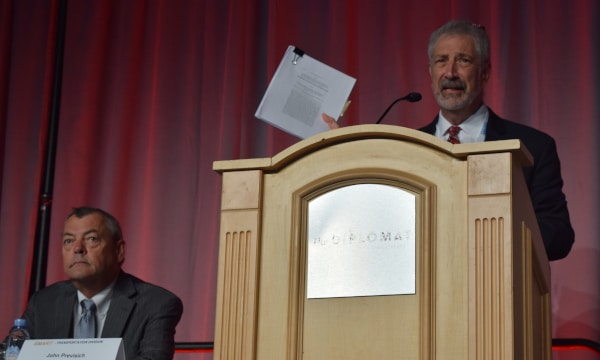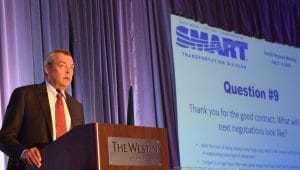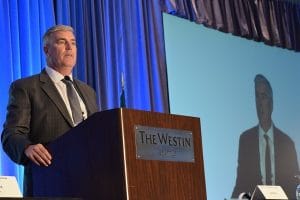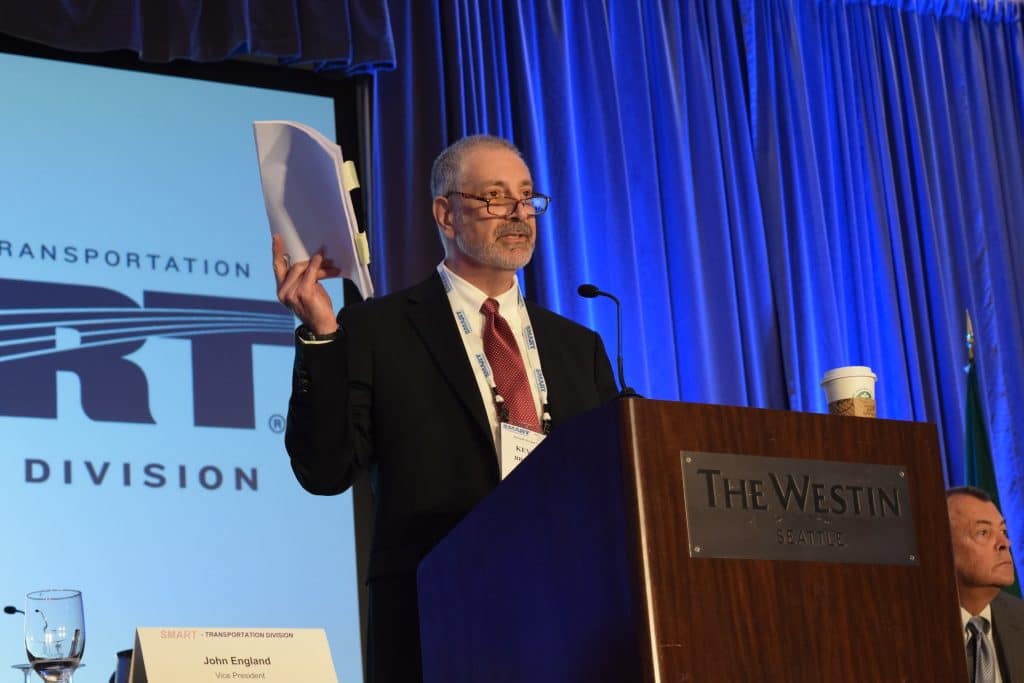https://youtu.be/VfiURJRJgWc?t=1s
HOLLYWOOD, Fla. — SMART Transportation Division General Counsel Kevin Brodar minced no words Tuesday, Aug. 7, when describing the 5-4 Janus v. AFSCME decision written by United States Supreme Court Justice Samuel Alito that was released this summer.
“His hate and loathing — and that’s being kind — for unions and working people drips from every page of this opinion, if that’s what you want to call it — an opinion,” Brodar said. “It’s less an opinion but more a right-wing manifesto as to how to eliminate unions.”
The 45-page Janus ruling taking away the ability of unions in the public sector to collect agency fees from “free-riders” has been an important topic at SMART TD’s Hollywood, Fla., regional meeting. In Monday’s combined opening session with Sheet Metal and TD sides in attendance, SMART General President Joseph Sellers Jr., General Secretary-Treasurer Rich McClees and TD President John Previsich all mentioned the precedent-destroying case.
Brodar, during the opening session of the second day, went into even more detail on the ruling.
“What Justice Alito tries to sell here is the two-century-old idea that unionism is just an excuse for legalized extortion,” Brodar said, holding up a printed copy of Alito’s opinion. “This case is an attack on working people. It’s an attack on all unions, not just public-sector unions. It’s an attack on this union.
“This is an attack on every one of you who goes out and does the hard work of defending the members, who goes out and does the hard work of standing against the tide of the carriers, who goes out and does the hard work of the long and tedious hours.”
Big-moneyed interests and industries have exacted a toll on workers throughout history – in injuries, blood and in some cases, human lives, Brodar said. In the early days of the labor movement, workers’ efforts to organize sometimes were met with armed responses intended to put down their resistance.
“No matter how many people were killed, however, the industrialists and the right-wingers and the conservatives and the business interests could not kill the idea of unions,” Brodar said. “They could not kill the cause because the cause is a righteous cause … You are the heirs to that fight.”
Those same forces that tried to suppress unions in the past exist today in the form of union foes such as Alito, the Koch brothers, the Federalist Society and other billionaire backers, Brodar said. This time, those enemies of labor are playing a long game with the Janus ruling being one step in their attempts to kill unions.
“Their new tactic is death from strangulation. They hope to dry up the union funds until the unions can no longer function and they just disappear and go away,” Brodar said.
The Janus decision “is essentially a green light for people to freeload” from public-sector unions, he said, and private sector unions likely will be next to be targeted.
“Look at the people sitting next to you. This affects your brothers and sisters in this room, in this union today, tomorrow,” Brodar said. “If you don’t think they are coming for the private sector, wake up and smell the coffee. That’s the next thing that is going to happen.”
Members will have to make a choice to fight back to preserve that which gives them a middle-class lifestyle, Brodar said. They can do that by educating their fellow members, their friends, neighbors and anyone else they can about what these anti-union forces are trying to accomplish through stacking the courts, trying to get right-to-work-for-less laws and other means.
“It’s up to us to respond. We can’t sit back, because if we do, we will disappear,” Brodar said. “We need to go out and educate every member every day, every way.”
Tag: Janus v. Afcsme
SEATTLE — SMART Transportation Division President John Previsich answered questions from members about the Janus decision, upcoming 2019 national rail labor contract negotiations and discussed new technological initiatives.
The Janus decision affects a handful of properties that have SMART TD representation, but leaves rail properties relatively unscathed for the time being, Previsich said.
“Our rail people, for the most part, don’t worry about it — yet,” he said. “The direct result of this decision will not directly affect anyone who works for BNSF, UP, CSX, NS, most of your short lines…”
Potentially one rail property and some bus properties could be affected by Janus, he said.
“Where we do have to worry is our operations that are operated by the public agency not under the Railway Labor Act — typically it’ll be a municipal bus company,” Previsich said. “We’ve had meetings with each and every property. They’ve already been contacted, they know what to do and we’ll go ahead and work our way through. ”
It’s those future attacks from anti-labor interests and court cases that we’ll have to be aware of in this era where all branches of government are stacked against labor, he said.
“They’re not done yet — we’re going to see more of it,” Previsich said. “Not only are both houses of Congress lined up against us, the White House is lined up against us and the Supreme Court is lined up against us.”
To fight back, union brothers and sisters, their friends, neighbors, families and others will need to vote and get the word out on issues important to the union, such as safety.
“Elections matter,” Previsich said.
Also regarding politics, a member asked about how the viewpoints of members who are more conservative would be addressed.
“We welcome a free and honest dialogue and discussion about a number of issues,” Previsich said. “But the one thing that we need to do, that we’re going to do and what we are going to continue to do is to educate our members about our issues.”
Some members may have strong feelings on conservative issues, but those issues need to be balanced with the impact it will have on their livelihood and their families, he said.
“Not everybody is going to vote the way I would like them to vote, I understand that,” Previsich said. “But what I do want, and I think what we all want, is for those votes to be educated votes. We want the people casting the ballots to know what the issues are.”
Also ahead, is the start of negotiations for a new national rail contract, which is up in 2019, with a number of details to be determined.
Previsich said that the joint negotiating tactics by unions that were successful in the last contract will be repeated at least at the outset of the new talks as the carriers offer up their resistance.
“Going into those negotiations, there are some things you can count on,” he said. “Number 1, they won’t want to give us any more money; Number 2, they’re going to want to attack our healthcare … they’re going to go after our workers. That’s standard, that happens every time.”
The labor side is well aware of the breaks the carriers got with the Republican tax plan that was passed in late 2018, and that will definitely be in play during contract talks, Previsich said.
“Our job this time is to get a better deal than we got last time. That’s what we’re looking for — that’s what we’re always looking for,” he said. “They can’t hide behind finances. Not only do they have record revenues and record profits, it’s record tax cuts, record givebacks, record stock buybacks…the economics are going to work in our favor this time around.”
A Section 6 filing to signal the start of negotiation will be filed in the future, he said.
SMART TD also is improving its technological base, Previsich said.
“One of the things we are trying to do is leverage the technology in a way that is going to improve communications that we have,” Previsich said.
Questions were submitted by members using the upgraded and improved SMART TD app. It can be downloaded from the Apple App Store or through Google or by visiting smart-union.org/td/mobile.
Also ahead are upgrades from the decades-old legacy system to help improve how local secretaries and treasurers do their jobs with a rollout planned to begin in October with full implementation in January 2019.
SEATTLE — SMART General President Joseph Sellers Jr. said Tuesday that the union will move in a unified direction at all levels in the fight against the ongoing attack on labor by monied right-wing interests.
His call to action at the second day of the SMART Transportation Division Regional Meeting came a week after the Janus v. AFSCME case that overturned the ability of public sector unions to collect agency fees from “free-riders” — people who are represented by a union and benefit from union negotiating on areas such as health care and contract negotiations but do not pay dues.
“Our theme — Strength through Unity — that is perfect and appropriate for this time,” Sellers said. “We need to roll our sleeves up. We need to put sweat equity into the changes that we need to make on behalf of our union, on behalf of your local on the behalf of the good and the welfare of our members and members to come.”
The 5-4 decision in a fractured U.S. Supreme Court drives a wedge between unions and the financial resources unions have to spend representing workers, weakening unions’ ability to represent and protect workers, Sellers said.
Janus is a reversal of the 1977 precedent-setting Abood v. Detroit Board of Education case, a 9-0 decision made by what SMART Transportation Division General Counsel Kevin Brodar described Monday as a “who’s who” of Supreme Court justices. Current Justice Samuel Alito and four other conservative justices banded together for the reversal.
“This is supposed to be the most honorable court in the world, the most independent court in the world, but this is a radical act — a radical act to undo decades — four decades — of precedent,” Sellers said.
And already the agents of big business are beginning campaigns to reach out to members of the affected public-sector unions — traipsing through neighborhoods and knocking on doors, trying to convince members to stop supporting their union financially.
“They’re going out there and they’re spending their money and the Koch brothers as we heard yesterday continue to go after unions and working people and working families,” Sellers said.
Those big-money businesspeople hate that unions such as SMART and other AFL-CIO members have financial resources to leverage — the Janus decision is one way those one-percenters are trying to reduce labor’s clout, divide unions and also to lower wages and benefits for workers.
It’s already evident in the 28 right-to-work-for-less states, where benefits and wages decline across the board. Workplace safety also deteriorates, with occupational fatalities in those states going up 14 percent in the 24 years that right-to-work-for-less has existed, Sellers said.
“This is big business and this is the far-right. This is the majority at this time … but with our heart and our hard work, that will end in November,” Sellers said. “That is where our strength comes from — 200,000 members in our organization working together pulling on the rope together in the same direction, making sure that we are not weakened.”
He called upon local chairpeople to intensify their organizational efforts and communication — the union’s “grassroots campaign.”
“We need to make sure that we have our game together,” Sellers said. “We need to make sure that we educate our members. We have a mid-term election coming up, and we can change that paradigm, but it’s not going to happen by itself. It’s not going to happen without our hard work.
“We need to be laser-focused as we fight back and take back one or possibly two branches of this government.”
Sellers said that the SMART Army’s community activism efforts, face-to-face contact and the use of avenues such as social media and text messaging will also help make SMART stronger, more united and improve communication with members.
“We need to make sure that we, at every level of this organization, are fighting back with one voice,” he said.
To join the SMART Army and stay up to date, members should text “SMART” to 21333 and follow the prompts. Messaging and data rates may apply.
Strength, unity and education will be the way to fight the United States Supreme Court’s 5-4 decision last week on Janus v. AFSCME 31 that overturned more than four decades of legal precedent.
That was the message given at the opening session of the SMART Transportation Division Regional Meeting on July 1 in Seattle.
The 49-page decision written by Justice Samuel Alito and supported by the four other conservative justices eliminates the ability of public sector unions to collect agency fees from those employees who refuse to be union members, yet still receive the benefits negotiated by unions.
“Janus is something that is indicative of an anti-labor movement in certain parts of the government that they’re working very hard to take away the rights and privileges that we have worked for for a number of years,” SMART Transportation Division President John Previsich said.
SMART TD General Counsel Kevin Brodar explained to attendees the magnitude of the decision and how the conservative tilt of the court, achieved with the installation of President Donald Trump’s nominee Neil Gorsuch, poses an ongoing menace to labor.
“It is everything we thought it would be,” Brodar describe the Janus decision, written by Alito. “From every page drips his contempt for labor and unions. This is less a legal opinion as it is a right-wing manifesto against labor. That’s the sad story.
“Justice Alito and his Federalist Society conspirators are once again trying to sell the public on a two-century-old idea that organized labor is nothing more than legalized extortion. Having lost the battle of ideas over the years because unions are still here, they have taken the idea that they can strangle unions out of existence by ending their funding.”
Janus overturns the 9-0 decision in Abood v. Detroit Board of Education made in the 1970s in which, Brodar said, “some of the heaviest hitters in the legal field” all agreed that unions had the power to collect agency fees from “free-riders,” non-paying members who still received benefits negotiated by the unions.
“This is essentially a green light to anyone who wants to stop paying unions dues in the public sector,” Brodar said. “The idea is to drain union coffers of their money, drain them of their political clout, drain them of the ability to represent their members. With that, disappears a decent wage, pension plans, health care — all gone. That’s the plan of this case.”
The Janus decision is another attack on the United States labor movement, Brodar said — the newest moment in a long line of resistance against people uniting for a common cause to improve their lives.
“This case is an attack on working people. It’s an attack not just on public sector unions, but all of us in this room. This is an attack on every member of this union,” Brodar said. “No matter how many bayonets and bullets they used, they couldn’t kill the idea. They couldn’t kill the cause. It exists today. Why is that? Because this is a righteous and just cause. And you, all of you here, are the heirs to that cause.”
The fight will continue, Brodar said, and he urged members to come together, educate themselves and be prepared to battle future efforts to weaken the power of labor and tip the scales in the favor of the carriers.
“This is not the last shot. There will be many more shots coming. It’s up to us to respond,” Brodar said.
“If this union disappears, there are dark days ahead. There are dark days right now — there will be another Supreme Court appointment who won’t be a labor-friendly guy.
“What we need is solidarity. It’s solidarity that brought us here,” Brodar said. “There’s work to be done, and it’s time.”



